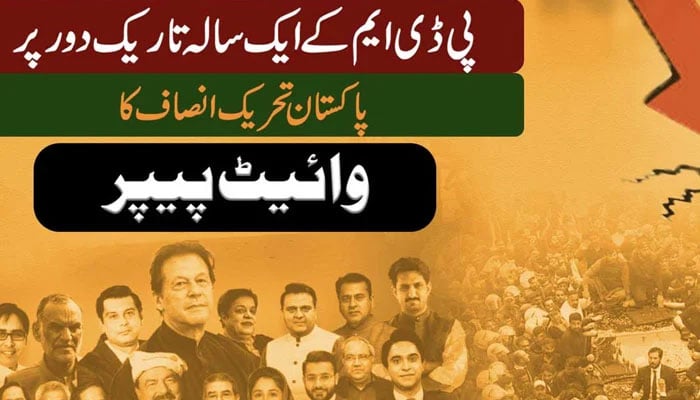‘White paper’: PTI terms govt’s one-year performance as ‘dark period’
Imran Khan-led party also threatens to take to streets if general elections are not held
As the Pakistan Democratic Movement (PDM) — a multi-party ruling alliance — completed its one year in government on April 9 (today), the Pakistan Tehreek-e-Insaf (PTI), the former ruling party, issued a 'white paper' on the incumbent government’s “one-year dark period”.
In its white paper, the PTI — whose government was toppled on April 9 last year through a vote of no confidence in the National Assembly — highlighted the incumbent government’s "poor governance, rising inflation and other issues".
The 51-page “white paper” has been divided into six sections. Details of human rights violations by the incumbent government and statistics related to economic destruction and inflation have been made part of the document.
Details of police and Rangers’ operation at PTI Chairman Imran Khan’s residence in Zaman Park, cases against the former prime minister and other supporters of the party and detentions are also given in the white paper.
In addition to this, amendments to the National Accountability Bureau (NAB) laws and postponement of elections are part of the "white paper".
‘Will take to streets if elections are not held’
Earlier today, Imran Khan — in a video address marking one year since his ouster — threatened to take to the streets if the elections are not held in the country.
“There is no other way except the elections," he said.
It is pertinent to mention here that the Supreme Court (SC) on April 4 declared the Election Commission of Pakistan's (ECP) decision on the Punjab and Khyber Pakhtunkhwa (KP) elections null and void, ordering to hold snap polls — a persistent demand forced by the PTI chairman after he dissolved the assemblies in both the provinces.
The decision was announced by a three-member bench headed by Chief Justice of Pakistan (CJP) Umar Ata Bandial and comprising Justice Ijaz Ul Ahsan and Justice Munib Akhtar as members, which declared the ECP's decision to hold polls on October 8 instead of April 30 illegal.
The Supreme Court, in its verdict, states that the ECP's order dated March 22, 2023, is declared to be unconstitutional, without lawful authority or jurisdiction, void ab-initio, of no legal effect, and is hereby quashed.
"Neither the Constitution nor the law empowers the commission to extend the date of elections beyond the 90 days period as provided in Article 224(2) of the Constitution," the verdict said.
The government, however, is reluctant to comply with the verdict.
Meanwhile, the National Assembly on April 6, passed a resolution rejecting the three-member SC bench’s "minority" verdict on the Punjab elections and made it binding on Prime Minister Shehbaz Sharif and his cabinet not to implement the decision.
It noted that the National Assembly on March 28 in a resolution called on the Supreme Court to avoid "interfering" in political matters. It also observed that multiple sections of the society had repeatedly urged the apex court to form a full court bench but their calls were ignored and only one political party was heard in the case.
Referring to the ongoing police crackdown against his party leadership, Khan said that the incumbent government would not keep them silent if “everyone is put in jails and our hands are tied”.
The deposed premier further said that as many as 144 FIRs — including sedition cases — have been registered against him.
-
Security forces gun down 30 terrorists in multiple IBOs in KP: ISPR
-
MQM-P calls for new province in Sindh
-
US report validates Pakistan military edge over India: PM
-
Banned TTP poses serious threat to Pakistan security: UNSC panel
-
CM Afridi clarifies remarks on by-poll after ECP requests army deployment
-
Dubai sees 3.2m Pakistani passengers in 2025 as airport sets new milestone
-
Security forces kill 23 Indian proxy terrorists in KP's Kurram
-
Pakistan to construct island to boost oil exploration: report












